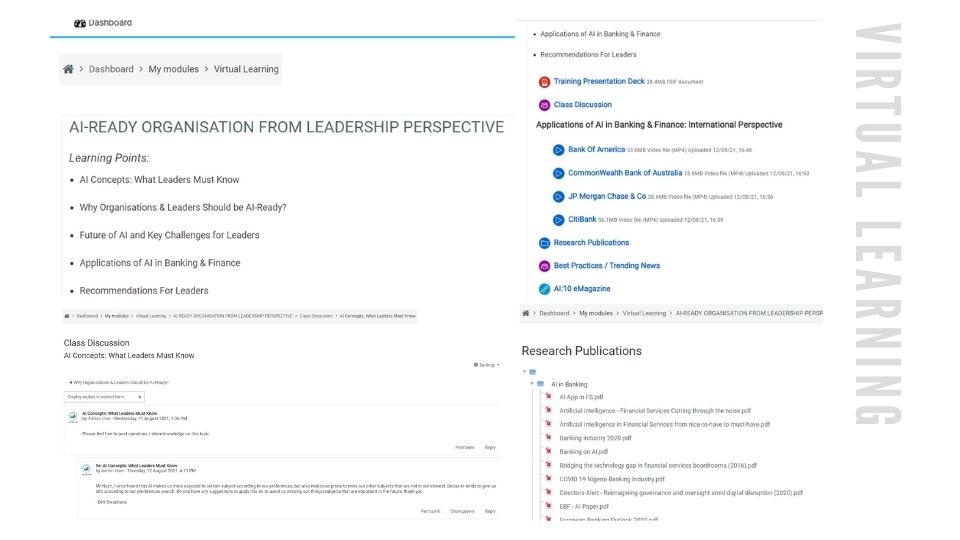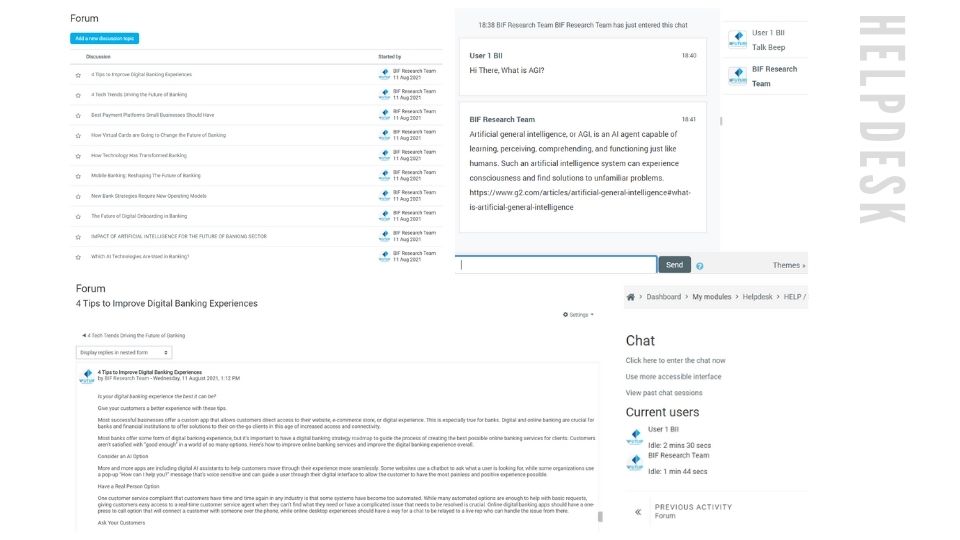
Empowering Youths in 3 Core Capitals to be Future-Ready:
Social Capital | Financial Capital | Intellectual Capital



This module will cover the topic of global trends in innovation, which is a key driver of economic growth and development. Some of the trends that will be discussed include the digital transformation of industries, the importance of collaboration and open innovation, the increasing focus on sustainability and social impact, the rise of entrepreneurship and the gig economy, and the emergence of innovation in emerging markets such as China and India. The programme will explore how these trends are shaping the business landscape and how organizations can stay ahead of the curve in the fast-changing world of innovation.
This module will explore the role of entrepreneurship in driving innovation. Entrepreneurs are often at the forefront of introducing new ideas and technologies to the market, and their risk-taking and agility can be key to driving innovation in a variety of industries. The module will delve into how entrepreneurs identify and pursue new opportunities, how they build and scale their businesses, and the challenges and successes they encounter along the way. It will also examine the role of entrepreneurship in shaping the broader business landscape and how organizations can foster a culture of entrepreneurship within their own ranks to drive innovation and growth. The module will include case studies, interactive exercises, and expert insights to provide a comprehensive understanding of the dynamic and evolving landscape of entrepreneurship and innovation.
This module will examine the challenges and opportunities that organizations face when it comes to innovation. On the one hand, innovation can bring about significant benefits, such as increased efficiency, competitiveness, and market differentiation. On the other hand, it can also present a number of challenges, including the need to constantly adapt to changing markets and technologies, the risk of failure, and the potential for disruption. The module will explore how organizations can navigate these challenges and seize opportunities to drive innovation and achieve success. It will also delve into the various tools and approaches that organizations can use to foster a culture of innovation, including design thinking, lean startup methodologies, and agile approaches. Through a combination of lectures, discussions, and hands-on activities, participants will gain a deep understanding of the complexities and rewards of innovation in the modern business environment.
Digital transformation refers to the incorporation of digital technologies into all areas of a business, resulting in fundamental changes to how the business operates and delivers value to customers. This module will explore how digital technologies are disrupting traditional business models and creating new opportunities for organizations. It will examine the key drivers of digital transformation, including the proliferation of mobile devices, the growth of the Internet of Things, and the rise of artificial intelligence and machine learning. The module will also delve into the strategic and operational considerations that organizations must make when embarking on a digital transformation journey, including the need to build a culture of innovation, align business and IT objectives, and develop new skills and capabilities. Through case studies, interactive exercises, and expert insights, participants will gain a practical understanding of how to leverage digital technologies to drive business success.


Identifying opportunities is a crucial step in the innovation process, as it helps organizations to identify new areas for growth and development. This module will focus on the key elements of opportunity recognition and evaluation, including how to identify unmet customer needs, how to assess the feasibility and viability of new ideas, and how to evaluate the potential impact and return on investment of different opportunities. The module will also delve into the role of customer discovery and market research in identifying opportunities, and will provide participants with practical tools and techniques for conducting these activities. Through a combination of lectures, discussions, and hands-on exercises, participants will gain a comprehensive understanding of how to identify and evaluate opportunities in a variety of contexts.
Strategic thinking is a crucial skill for business leaders, as it involves the ability to anticipate and respond to changes in the business environment and to make informed decisions about the direction and focus of the organization. This module will explore the key elements of successful global business strategy, including how to analyze the competitive landscape, how to identify and leverage key resources and capabilities, and how to develop a vision and mission that aligns with the organization’s goals and values. The module will also delve into the role of scenario planning and strategic foresight in shaping strategic thinking, and will provide participants with practical tools and techniques for developing and implementing effective strategies. Through a combination of lectures, discussions, and hands-on exercises, participants will gain a deep understanding of the thought process and skills necessary to create a successful global business strategy.
Change is a constant in the business world, and the ability to effectively manage and navigate change is a key skill for business leaders. This module will focus on the key elements of change management, including how to recognize and anticipate change, how to communicate and engage stakeholders in the change process, and how to develop and implement strategies for successfully navigating change. The module will also examine the role of leadership in managing change and will provide participants with practical tools and techniques for leading and managing change in a global context. Through a combination of lectures, discussions, and hands-on exercises, participants will gain a comprehensive understanding of how to recognize and respond to change in a global context.
Financial acumen is a key competency for business leaders, particularly when it comes to conducting business internationally. This module will focus on the financial considerations that organizations must take into account when operating in a global context, including the impact of exchange rates, the importance of financial planning and budgeting, and the need to manage financial risk. The module will also examine the role of financial reporting and analysis in decision-making and will provide participants with practical tools and techniques for understanding and interpreting financial data. Through a combination of lectures, discussions, and hands-on exercises, participants will gain a deep understanding of the financial implications of conducting business internationally and will develop the skills and knowledge necessary to make informed financial decisions.
Risk management is a critical component of conducting global operations, as it helps organizations to identify and mitigate potential risks and to make informed decisions about how to allocate resources and manage risk exposure. This module will focus on the key elements of risk management, including how to identify and assess different types of risk, how to develop and implement risk management strategies, and how to monitor and review risk management processes. The module will also delve into the role of risk management in compliance and governance and will provide participants with practical tools and techniques for managing risk in a global context. Through a combination of lectures, discussions, and hands-on exercises, participants will gain a comprehensive understanding of how to identify and mitigate risks when conducting global operations.
Effective negotiation is a key skill for business leaders, particularly when it comes to working with international partners. This module will focus on the key elements of negotiation, including how to prepare for negotiations, how to build and maintain relationships, and how to make and defend proposals. The module will also examine the role of cultural differences in negotiation and will provide participants with practical tools and techniques for negotiating effectively with international partners. Through a combination of lectures, discussions, and hands-on exercises, participants will gain a deep understanding of the principles of effective negotiation and will develop the skills and confidence necessary to negotiate successfully in a global context.
The X-Factor Portfolio is a collection of high-potential companies that have been carefully selected for their innovation, growth potential, and market disruption. As a student, you will be asked to choose one company from this portfolio for further analysis and discussion. This is an exciting opportunity to learn about some of the most innovative and forward-thinking companies in the market today, and to gain a deeper understanding of how they are driving change and shaping the future of their respective industries. When choosing your company, consider factors such as the industry it operates in, its business model, its market positioning, and its financial performance. Be sure to carefully research and evaluate each company before making your final selection, as this will be an important part of your learning experience.
As a trainee, you will be asked to identify and explain one key successful attribute of a leader and how it has led to success for the organization. This is an important part of your learning and development, as understanding the characteristics and behaviors of effective leaders can help you to become a more effective leader yourself. When completing this task, be sure to choose a specific attribute and provide specific examples to illustrate how it has contributed to the success of the organization. For example, you might choose to discuss a leader’s ability to communicate clearly and effectively, and explain how this has helped to align the team around a shared vision and drive them towards common goals. Alternatively, you might choose to focus on a leader’s ability to foster collaboration and teamwork, and explain how this has helped to create a more positive and productive work environment. Whatever attribute you choose, be sure to back up your points with concrete examples and evidence.
As a trainee, you will be asked to identify and explain one key successful strategy that has been adopted by an organization and how it has led to its success. This is an important part of your learning and development, as understanding the strategies and tactics that organizations use to achieve success can help you to be more effective in your own career. When completing this task, be sure to choose a specific strategy and provide specific examples to illustrate how it has contributed to the success of the organization.
As a trainee, it is important to understand the financial outcomes of an organization’s overall strategies and leadership styles. These outcomes can have a significant impact on the organization’s success and long-term viability. When identifying and explaining the financial outcomes of an organization’s strategies and leadership styles, it is important to consider both the short-term and long-term effects on key financial metrics such as revenue, profitability, and stock price. You should also consider how the organization’s financial performance compares to that of its competitors, and how it has been able to achieve a competitive advantage through its strategies and leadership. It is important to use financial data and other relevant sources to support your analysis and conclusions. This will help you to gain a deeper understanding of how strategic decisions and leadership practices can impact an organization’s financial performance and success.
Strategic planning is the process of defining an organization’s direction and making decisions on allocating its resources to pursue this direction. It involves setting goals, analyzing the competitive environment, and identifying external and internal factors that may affect the organization. This module will focus on the development of a strategy for the organization, including how to conduct a strategic analysis, how to identify and evaluate strategic options, and how to develop and implement a strategic plan. The module will also examine the role of stakeholder engagement and communication in the strategic planning process and will provide participants with practical tools and techniques for developing and executing a successful strategic plan. Through a combination of lectures, discussions, and hands-on exercises, participants will gain a deep understanding of the strategic planning process and will develop the skills and knowledge necessary to create and implement a comprehensive and effective strategy for their organization.




AI TECH BUILT AROUND YOUR COMPETENCIES OR EXPERTISE